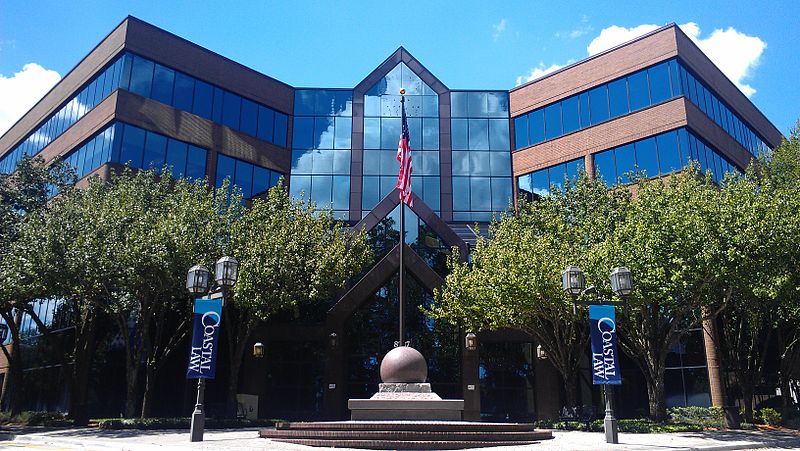ABA again says no to Florida Coastal’s nonprofit application and makes noncompliance finding

Florida Coastal School of Law. Photo from Wikimedia Commons.
Florida Coastal School of Law is out of compliance with two sections of Standard 202, which deals with program resources, according to a public notice posted by the council of the ABA’s Section of Legal Education and Admissions to the Bar.
In addition to the November noncompliance finding, the council again denied the law school’s substantive change application to convert to a nonprofit law school. Florida Coastal is owned by the for-profit InfiLaw Corp., an entity of the private equity firm Sterling Capital Partners. It’s the last of three InfiLaw law schools that remains open and is not operating under a teach-out agreement.
“We intend to submit a prompt response designed to clarify our position and resolve any confusion or concerns that may exist. We would also note Coastal’s dramatic progress in the past year or two recruiting stronger students—and the significant improvement in bar examination performance and our current No. 1 ranked moot court program,” Peter Goplerud, the law school’s president, told the ABA Journal.
Between 2019 and 2018, LSAT percentiles at the law school decreased, according to Standard 509 Information Reports that can be found here and here. There was also a decrease in undergraduate grade-point average percentiles, except for students in the 75th percentile, where the average remained at 3.36.
Florida Coastal’s first-time pass rate for the July 2019 Florida bar exam was 71%, compared to 62.5% in July 2018. Its ultimate bar passage rate for last year, which is based on 2016 graduates, is 64.54%, according to ABA data.
According to the ABA council’s finding, Florida Coastal is out of compliance with Standard 202(a), which requires that law schools have current and anticipated financial resources to carry out a legal education program in compliance with ABA standards, and Standard 202(d), which states that a law school is out of compliance if its anticipated financial condition is “reasonably expected” to have a negative impact on meeting the standards.
In 2019, the U.S. Department of Education also required a letter of credit from Florida Coastal to release federal student aid. The requirement followed the law school not meeting fiscal responsibility standards required by the department for the fiscal year ending in 2018.
The council asked the law school to submit a report by Jan. 15, and an administrative appearance is scheduled for May 2020.
In 2019, three law schools were found to be out of compliance with Standard 202. In addition to Florida Coastal, the University of Louisville Louis D. Brandeis School of Law was found to be out of compliance with the standard in November.
Another noncompliance finding was made for Western New England University School of Law in August. But by November, the council found that the law school was in compliance with the standard.
The multiple Standard 202 findings don’t indicate a trend, says Michael A. Olivas, a retired law professor at the University of Houston and a former president of the Association of American Law Schools.
“It’s sort of like Tolstoy; every family suffers in a different way. Each one of these schools, and there could be more, came to its situation through a very different mechanism,” Olivas says.



